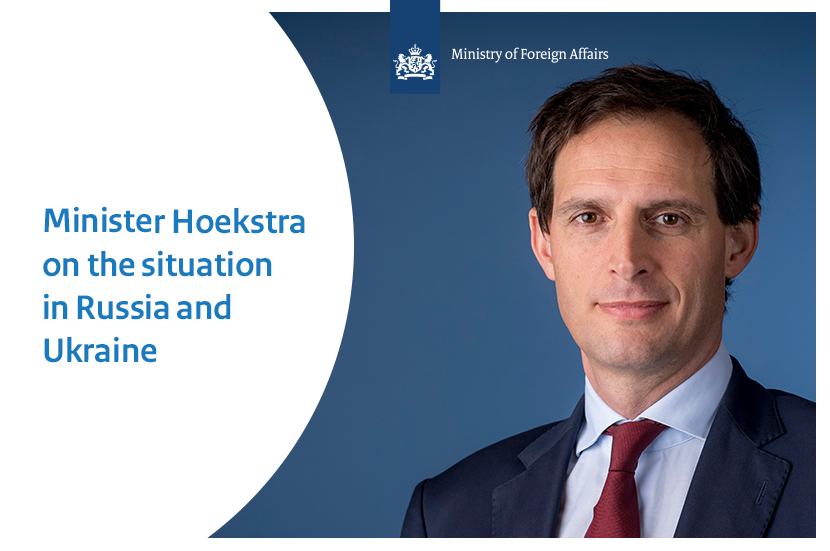Wopke Hoekstra: ‘What happens in Ukraine affects us in the Netherlands too’
Minister of Foreign Affairs Wopke Hoekstra explains why it is important for the Netherlands to be actively engaged with the situation on the Ukrainian border, and outlines what the Netherlands is doing to prevent a further escalation of tensions with Russia.
A very assertive Russia
‘What happens on Europe’s border also affects us in the Netherlands. We’re dealing with a Russia that’s deliberately intimidating its neighbour by deploying tanks and troops to the border. Since 2014 Russia has repeatedly used force against Ukraine, for example in its illegal annexation of Crimea. And then there is conflict that has been raging for years in eastern Ukraine, claiming 13,000 lives since 2014 and displacing 1.3 million people.'
‘If we allow these kinds of actions in Ukraine, we’re sending a signal to Russia that such conduct is okay everywhere. That it’s acceptable to threaten violence if you don’t get your way.’
Ukraine: a European neighbour
‘It’s worth considering how close Ukraine is to us. Kyiv is about as far away from the Netherlands by car as Lisbon, yet for most Dutch people, Lisbon feels much closer. Ukraine is a European neighbour, and what happens there affects us here too.'
‘In 2014 we all saw and felt what this means, when flight MH17 was shot down over eastern Ukraine by a Russian missile, supplied by Russia, to pro-Russian rebels. This gives us a special bond with Ukraine. We share that suffering, and together we are pursuing truth and justice for the victims.’
Justice for Ukraine
‘Ukraine is a free, independent and democratic country, and is thus entitled to make its own choices. Everyone must accept that, including Putin.'
‘Ukraine is a free, independent and democratic county, and is thus entitled to make its own choices'
‘In Helsinki in 1975, European countries agreed not to threaten one another with violence. The Soviet Union was also party to this agreement, but Russia is now flouting it.'
‘For a country like the Netherlands in particular, it’s important that – together with other countries – we draw a line in the sand. As one of the world’s major trading nations, we depend strongly on international justice and stability.’
The Netherlands’ approach: pressure and dialogue
‘Together with our partners in the EU and NATO we are taking an approach that combines pressure and dialogue. Above all we’re striving for a diplomatic solution. In the end this is the only way to achieve lasting stability. This can never happen through violence or threats. It can only happen around the negotiating table.'
‘Dialogue, not violence, is the way to achieve stability’
‘We achieve stability through dialogue. We continue to do our utmost to resolve the crisis and prevent further escalation. With the support and input of the Netherlands, the US, the EU, NATO and the Organization for Security and Co-operation in Europe (OSCE) are attempting to find a solution with the Russians at the negotiating table.
‘But at the same time we also have to apply pressure. Within the EU we are drawing up a robust package of sanctions in order to make clear that an invasion will carry a very high price for Russia. But we shouldn’t be naïve. We are also preparing for a scenario where talks break down. NATO and the EU form a united front.’
Visit to Berlin, Paris and Ukraine
There is strength in unity. With this in mind the Netherlands has been actively communicating with its allies, in order to prevent a further escalation in tensions. For example Minister Hoekstra was in Berlin on 26 January and in Paris on 28 January. At the moment he is in Ukraine. These visits focus on the situation on the Ukrainian-Russian border.
